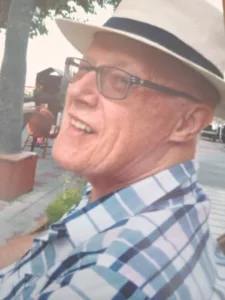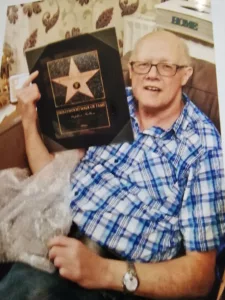
20 Dec 2023
‘I’ve been so lucky’: Stephen’s 40 years of remission
Stephen Fallon has enjoyed over 40 years of family, work and regular life – all thanks to a bone marrow donation in his early 20s. Stephen was diagnosed with leukaemia in 1983, and underwent extremely gruelling treatment, culminating in a life-saving stem cell transplant from his own brother.
“In 1983 I was a fairly fit 24-year-old,” said Stephen, who lives in Newport, Wales. “I had a good job in a powder coating factory, which was a very physical job, and I’d just met a lovely young woman called Lillian. We’d moved into our first home together in Newport, so life was good.
 “But suddenly this changed and I was feeling exhausted after a couple of hours work. I’d go to work and of instead getting tired by the end of the day I was exhausted by lunchtime. I mentioned it to my boss that I didn’t feel well and he said well have you been to the doctor? So I booked an appointment.”
“But suddenly this changed and I was feeling exhausted after a couple of hours work. I’d go to work and of instead getting tired by the end of the day I was exhausted by lunchtime. I mentioned it to my boss that I didn’t feel well and he said well have you been to the doctor? So I booked an appointment.”
Stephen’s GP immediately sent him to the Royal Gwent Hospital in Newport.
“They took blood tests and admitted me,” said Stephen. “The following day they did a bone marrow test from my breast bone which scared me. The next day the result came back and my wife and myself were told I had to start chemotherapy straight away because I had acute myeloid leukaemia (AML). I was moved to University Hospital Cardiff that day and so it began.”
Stephen’s gruelling treatment took many months to complete.
“The vomiting was quite unbearable and all my hair fell out the week after I started my first chemotherapy,” said Stephen. “They dealt with the worst of the side effects, but it took around 10 or 11 months to go into remission, all this time I was back and forth to UHW with quite a large selection of infections all were dealt with by antibiotics. They put a Hickman catheter in me because all my veins collapsed.”
Stephen was then told he would need a stem cell transplant to give him the best chance of remaining in remission. All his family were tested as possible bone marrow donors, and his brother Keith came up as a perfect match.
“I’d been remission for six months by that time and back at home. But in November 1984 I had to go back into hospital a week or two before the transplant into an isolation room – which in those days was just a room off a ward still with people coming and going! I had full body radiation before the transplant. I was lucky that I was mostly fine with no bad after-effects from the treatment.”
Stephen recovered well, just needing ongoing tests to check he remained in remission.
Stephen and Lillian had decided to get married in between his first treatment and his transplant – and happily are still together more than 40 years later.
“She was great, she just worked around everything that happened to me,” said Stephen. “I don’t think about it a lot but every now and then it hits me that I’m on borrowed time. Also when I see people in the same situation on TV it makes me really emotional.”
 Stephen has had to live with chronic kidney disease which he believes the treatment contributed towards, as well as cataracts which are a common side effect of chemotherapy. But his leukaemia has gone.
Stephen has had to live with chronic kidney disease which he believes the treatment contributed towards, as well as cataracts which are a common side effect of chemotherapy. But his leukaemia has gone.
“For years and years I’d have an annual checkup,” said Stephen. “But then after about 20 years they said to me well there’s nothing wrong with you so no need to come back.
“I am now coming up to my 64th birthday and so grateful to all the staff at UHW and of course my brother for giving me an extra 40+ years. I have a wonderful wife, two fantastic children and two granddaughters who I would never have seen.
“I have been so lucky, and it’s because I went to the doctor when my boss told me to and the GP acted quickly. So I would say to anyone that has any unexpected symptoms please, please get them checked out.”
Learn about the signs and symptoms of leukaemia.
Related posts
16 November 2021
Charities call on NHS to treat blood cancer equally in decision-making
The Blood Cancer Alliance undertook an evidence review to inform a new report exploring the unmet needs of people with blood cancer across the UK.
11 January 2019
Leukaemia UK and Leuka have merged
We are delighted to announce that on 1 November Leuka and Leukaemia UK merged
30 November 2023
Leukaemia UK invests in next generation of blood cancer trial leaders
This week, aspiring chief investigators of future cutting-edge blood cancer clinical trials took to Birmingham for the DIDACT Foundation’s inaugural Clinical Trials Workshop – an event funded by Leukaemia UK….
2 September 2024
Only 14% of Brits know the warning signs of leukaemia as thousands are diagnosed in A&E every year.
Leukaemia Care and Leukaemia UK are highlighting the urgent need to raise awareness of signs and symptoms to stop the deadly blood cancer devastating lives. New research has revealed that…